Simplifying Radical Expressions
In the last section every number under the square root
symbol was a perfect square. When this
happens the radical sign disappears and entire square root is replaced with with
a rational number.
When you find the square root of a perfect square there will not be a square
root in the answer.
 was replaced
with a 3 was replaced
with a 3 |
 was replaced
with a 5 was replaced
with a 5 |
 was replaced
with a 6/7 was replaced
with a 6/7 |
Most of the time the number under the square root is not a
perfect square. The square root of any
number that is not a perfect square can't be replaced by any fraction, decimal
or whole number. This
type of number is an irrational number. It represents a decimal that never ends
or repeats. Since you
cannot write such a decimal you cannot replace such a square root as a number
without a radical sign.
 |
 |
 |
| cannot be replaced | cannot be replaced | cannot be replaced |
| with a decimal or fraction, | with a decimal or fraction, | with a decimal or fraction, |
it stays |
it stays |
it stays |
Some square roots can be reduced to the square root of a smaller number
If the number under the square root is not a
perfect square then it cannot replaced with a number
without a radical sign. It may be replaced with an expression that has a smaller
number under the
radical sign.
 |
 |
 |
| can be replaced by | can be replaced by | can be replaced by |
 |
 |
 |
We call the process of replacing one square root
expression with another square root expression that
has a smaller number under the radical sign reducing or simplifying the
square root.
Multiplication Rule for Square Roots

This rule allows you to factor a number under
the square root into two (or more) factors and write the
factors as a product under two separate square roots. If one of the factors is a
perfect square then that
square root can be reduced leaving you with a number outside the radical times a
smaller square root
then the original square root you started with.

Simplifying Radicals using PERFECT SQUARE FACTORS
If you can find the largest perfect square factor
of the radicand then reducing the radical expression is
a short process. It requires that you find the largest perfect square that is a
factor of the original
radicand
Look for the largest perfect square that is a factor of the radicand. Factor than reduce.
| Example 1 | Example 2 | Example 3 |
 |
 |
 |
Example 1 Note: To use this technique you must
factor as
as and
not as
and
not as
| Example 4 | Example 5 | Example 6 |
 |
 |
 |
Example 6 Note: To use this technique you must
factor as
as and
not as
and
not as
The factor must be the largest square root factor
| Example 7 | Example 8 | Example 9 |
 |
 |
 |
| Example 10 | Example 11 | Example 12 |
 |
 |
 |
Simplifying Radicals using PAIRS OF FACTORS
If you can find the largest perfect square
factor of the radicand then reducing the radical expression is a
short process. Many students cannot find the largest perfect square factor or
they do not want to take
the extended time this may take. There is a alternate approach that is favored
by many students.
Two of the same factors under a square root
form a perfect square. This means that if you have a pair
of the same factors under a square root they can be reduced to a rational
number.
 |
 |
 |
| a pair of 2's under a square root reduce to the whole number 2 |
a pair of 3's under a square root reduce to the whole number 3 |
a pair of 5's under a square root reduce to the whole number 5 |
This fact allows us to use the Multiplication Rule for
Square Roots to completely factor a radicand into
its many factors and then take out the pairs of same factors
| Example 1 | Example 2 | Example 3 |
 |
 |
 |
| completly factor 24 | completly factor 24 | completly factor 24 |
 |
 |
 |
| put pairs of the same factor under thier own square root |
put pairs of the same factor under thier own square root |
put pairs of the same factor under thier own square root |
 |
 |
 |
| the pair of 2's can reduced | the pair of 2's can reduced | the pair of 2's can reduced |
 |
 |
 |
Completely factor the radicand and take out all the pairs of factors:
| Example 4 | Example 5 | Example 6 |
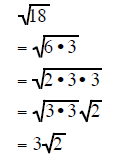 |
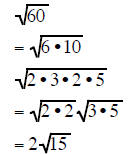 |
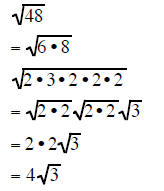 |
| Example 7 | Example 8 | Example 9 |
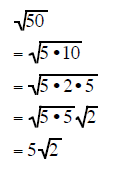 |
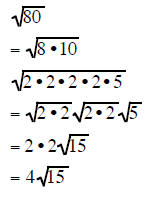 |
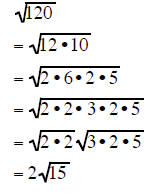 |
| Example 10 | Example 11 | Example 12 |
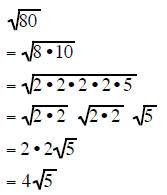 |
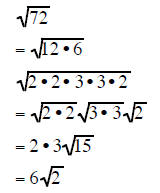 |
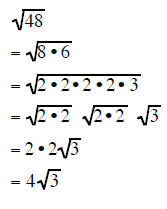 |


